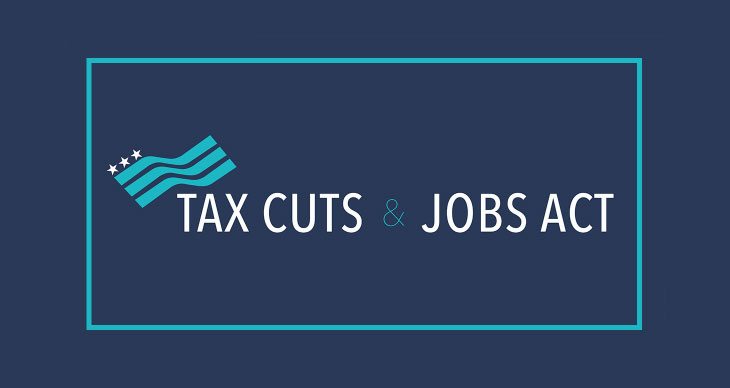
Tax Cuts and Jobs Act (TCJA) :
The Act to provide for reconciliation pursuant to titles II and V of the concurrent resolution on the budget for fiscal year 2018, Pub.L. 115–97, is a congressional revenue act originally introduced in Congress as the Tax Cuts and Jobs Act, that amended the Internal Revenue Code of 1986.
For 2018, the standard deduction amount has nearly doubled for all filers.
• Single or Married Filing Separately—$12,000.
• Married Filing Jointly or Qualifying Widow(er)—$24,000.
• Head of Household—$18,000.Deduction for personal exemptions suspended
• For 2018, you can’t claim a personal exemption deduction for yourself, your
spouse, or your dependents.Tax brackets and rates
• 10% on the first $19,050 of income for couples and $9,525 for individuals
• 12% above $19,050 for couples and $9,525 for individuals
• 22% above $77,400 for couples and $38,700 for individuals
• 24% above $165,000 for couples and $82,500 for individuals
• 32% above $315,000 for couples and $157,500 for individuals
• 35% above $400,000 for couples and $200,000 for individuals
• 37% above $600,000 for couples and $500,000 for individualsChanges to Key Itemized Deductions
Lowered the cap for interest paid from $1 million to $750,000 of mortgage debt and limited the deductibility of home equity debt.
Itemized Deductions
Deduction for personal casualty and theft losses suspended unless incurred in federally-declared disaster area
• Limitations to the deduction for state and local taxes
• Limitations to the deduction for home mortgage interest in certain casesSuspended the deductibility of interest on home equity loans and lines of credit unless they are used to buy, build, or substantially improve the taxpayer’s home that secures the loan.
Eliminating most miscellaneous itemized deductions such as:
• Deductions for employee business expenses
• Tax preparation fees
• Investment expenses, including investment management fees Employment related educational expenses
• Job search expenses
• Hobby losses
• Safe deposit box fees
• Investment expenses from pass-through entities
• Eliminated the limitation on itemized deductions for certain high-income taxpayersSALT – State and Local Income Tax
The deductibility of state and local tax payments for federal income tax purposes is now limited to $10,000 a calendar year.
Charitable contributions
• Remain deductible for those who itemize, and the current limitation of 50% of income is increased to 60%.
Limitation on Itemized Deductions
• The overall limitation on itemized deductions for higher income individual is no longer applicable
Alimony
• Starting in 2019, alimony would no longer be deductible by the payor for new decrees. Payments
would be excluded from the recipient’s incomeMoving Expenses No Longer Deductible
• The deduction for moving expenses has been suspended for most taxpayers
for tax years beginning after Dec. 31, 2017 through Jan. 1, 2026. This
suspension does not apply to members of the Armed Forces of the United
States on active duty who move pursuant to a military order related to a
permanent change of station.Child tax credit and additional child tax credit
• For 2018, the maximum credit increased to $2,000 per qualifying child. The
maximum additional child tax credit increased to $1,400. In addition, the
income threshold at which the credit begins to phase out is increased to
$200,000 ($400,000 if married filing jointly).Credit for other dependents
A new credit of up to $500 is available for each of your dependents who does not qualify for the child tax credit. In addition, the maximum income threshold at which the credit begins to phase out is increased to $200,000 ($400,000 if married filing jointly).
• There is no age limit for the $500 credit, but the tax tests for dependency must be met.
Social security number (SSN) required for child tax credit.
Your child must have an SSN issued before the due date of your 2018 return (including extensions) to be claimed as a qualifying child for the child tax credit or additional child tax credit. If your dependent child has an ITIN, but not an SSN, issued before the due date of your 2018 return (including extensions), you may be able to claim the new credit for other dependents for that child.
529 Education Savings Plan Changes
One of the TCJA changes allows distributions from 529 plans to be used to pay up to a total of $10,000 of tuition per beneficiary (regardless of the number of contributing plans) each year at an elementary or secondary (k-12) public, private or religious school of the beneficiary’s choosing.
What are the tax benefits of a 529 Plan?
Changes to the deduction for un- reimbursed employee expenses
• The Tax Cuts and Jobs Act also suspends all miscellaneous itemized
deductions that are subject to the 2 percent of adjusted gross income floor.
This change affects un-reimbursed employee expenses such as uniforms,
union dues and the deduction for business- related meals, entertainment
and travel.
• Thus, the business standard mileage rate cannot be used to claim an
itemized deduction for un-reimbursed employee travel expenses in taxable
years beginning after Dec. 31, 2017, and before Jan. 1, 2026Standard mileage rates for 2018
The standard mileage rates for the use of a car, van, pickup or panel truck for 2018 remain:
• 54.5 cents for every mile of business travel driven, a 1 cent increase from
2017.
• 18 cents per mile driven for medical purposes, a 1 cent increase from 2017.
• 14 cents per mile driven in service of charitable organizations, which is set by
statute and remains unchanged.Increased Depreciation limits
The Tax Cuts and Jobs Act increases the depreciation limitations for passenger automobiles placed in service after Dec. 31, 2017, for purposes of computing the allowance under a fixed and variable rate plan.
• The maximum standard automobile cost may not exceed $50,000 for
passenger automobiles, trucks and vans placed in service after Dec. 31, 2017.
Previously, the maximum standard automobile cost was $27,300 for
passenger automobiles and $31,000 for trucks and vans.Alternative Minimum Tax
1. The TCJA also made reforms to the Alternative Minimum Tax (AMT), which
means far fewer filers will need to spend time working on Form 6251. The
Internal Revenue Service estimates AMT filings will decrease from 10 million
to 1 million
2. The TCJA increased the AMT exemption from $84,500 to $109,400 for joint
filers and increased the phaseout of the exemption from $160,900 to $1
million for joint filersHealth Insurance
• Starting in 2019, the Affordable Care Act mandate that people have insurance
or face a fine imposed by the IRS would be repealed. This is expected to save
more than $300 billion over the coming decade, which was applied to offset
the cost of tax reductions.Not changed
• Private activity bonds used to build hospitals or low- income housing
• IRA and 401(k) accounts
• Adoption tax credit
• Earned income tax credit
• Affordable Care Act tax on investment income- Need more information? Contact Your local Winners Tax Service Office Today!
Where to get additional information
• PUBLICATION 5307
• Tax Reform Basics for Individuals and Families
• TAX YEAR 2018And Always
www.irs.gov – Where all the free information you want is always available
Businesses seeking information on the changes click here for more information.



